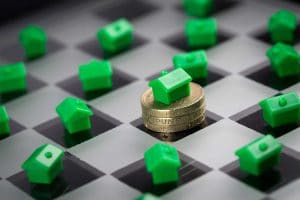Our economy is weakening, unemployment is rising, and overseas migration is temporarily on hold. 
Add to this weak sentiment and a temporary ban on public auctions and open home inspections.
Presumably, this can only have a negative impact on property prices.
The big questions are:
- How much will the market fall by?
- When will it reach the bottom? and
- If you’re considering a purchase, when is the best time to buy?
It is impossible for anyone to really know the answers, but guidance from Australia’s leading property experts and economists – backed by the most up to date data – is perhaps the best starting point.
SQM Research chief executive Louis Christopher says property prices could fall by up to 30 per cent, but may actually rise (talk about hedging your bets!!) [It is time to look back at our forecasts made back in October last year for 2020, SQM research, 7/4/2020]
- The 30 per cent fall is a worst-case scenario for Mr. Christopher, where Australia experiences a second wave of infections after the restrictions are lifted.
- However his best-case scenario, sees national property prices dropping by no more than 1 per cent over the year – and perhaps even rising by as much as 3 per cent – if New South Wales, Victoria and Queensland start to report no new cases by the end of April.
At the time of writing – 23 April 2020 – Australia has clearly cut the growth in new Coronavirus cases and Victoria’s chief health officer Dr Brett Sutton has advised Victoria should see zero daily new cases in about a month if the current trajectory continues and social distancing measures remain in place. [Australian Financial Review, Coronavirus Live: How the infection is spreading, retrieved 22/04/2020]
AMP Capital chief economist Shane Oliver says:
“If the shutdown is lengthy and goes on for more than six months, beyond the wage subsidies and bank repayment holidays, then prices could fall by at least 20 per cent due to falling demand. Alternatively if the shutdown ends after a few months and we’re mostly back to normal and businesses come off life support, then prices will only see a small decline of around 5 per cent.” [Oliver’s insights – The threat to Australian house prices from Coronavirus, AMP, 19/3/2020]
Leading property market researcher John Lindeman who has devoted his 40+ year career to understanding how the housing market works said yesterday
“We expect a general surge in housing demand to occur after the current crisis is over and the restrictions on movement and assembly are lifted. Rental demand will rise as tourism and holiday markets recover and we will experience an influx of migrants from other countries. As a result, many suburbs will experience excellent growth, with buy prices right now at their lowest”. [The toilet paper panic and property prices, Propertyupdate.com.au, published 21/04/2020]
There are clearly differing views…
But one thing most people agree on is that right now we are in a buyers market.
Buyers have more leverage in dictating prices and terms – therefore it’s definitely not the worst time to buy.
Furthermore, everyone’s personal circumstances are very different.
My wife and I personally bought a home last December (near what many would say was the top of the recent cycle), however we bought very well, it’s a long term principal place of residence, and we couldn’t be happier.
Here are some further thoughts of my own.
This is not property advice, just my personal views from researching the market and speaking daily to banks, buyers, sellers, agents etc.
- The experts are providing best case and worst case guidance, largely based on how the virus spread is minimised in Australia, and then the restrictions gradually lifted
- Australia has recorded less than 1 per cent new Covid-19 cases for the past nine consecutive days and just yesterday there announcements that certain beaches were reopening and IVF and low-risk elective surgeries can begin again – a positive sign that restrictions are already starting to ease [The curve is flattening, but not enough to return to normal, ABC News, retrieved 22/04/2020]

- The restrictions could be removed in the reverse order they were introduced, implying that public auctions and open home inspections may not be too far away
- Net overseas migration is a strong driver for property, and while that’s shut for the time being, there will be pent up demand and Australia will presumably become even more desirable in the future as one of the countries to best contain and recover from the virus
- Low interest rates, wage subsidies, and the six month repayment holidays most banks are offering now should prevent many forced or distressed sales in the short term
- The availability of stock, particularly high quality housing stock in the capital cities, will continue thinning, with many discretionary sellers putting off any plans to sell now
- We can also expect less buyers due to all the fear and uncertainty, particularly around employment – the volume of transactions will therefore likely decline
- While values may decline over the next few months, it probably has a lot to do with the current sentiment and restrictions in place, it is not necessarily reflective of intrinsic values

- Any property markets more exposed to tourism, accommodation and recreation activities are likely to face stronger headwinds, and possibly so too those markets more skewed towards first home buyers and investors
- We saw last year how quickly sentiment (and property prices) can turn, after the federal election in May 2019 there was a noticeable shift and the price trend reversed quickly – then without any warning or anyone ringing a bell vendor expectations became vastly different, and so too did the level of buyer demand and competition
- The fact most Australian housing markets were generally on the rise prior to Coronavirus suggests sentiment could turn quickly once our social and economic activities resume
It’s important to acknowledge that the property market in Australia is made up of hundreds of different sub-markets though, all of which perform very differently to one another, and even within these sub-markets there are always going to be individual situations which result in deals getting done on either side of ‘the averages’.
It follows that the best time to buy is:
- When you are in a strong financial position to do so, that is that you have a proper finance approval in place, plus confidence around your business or income; and
- When a great opportunity presents itself – this could be next week, or next month, or in 6 or 12 months (irrespective of what the economy and/ or the property market as a whole is doing)
If you bought a property today for 1.7 million, but in a normal market it was worth 2.0 million, then even if the market in aggregate falls by say 15% in nine months from now, and bottoms out at that level, then you’re no worse off financially for having bought today rather than (quote unquote) “at the bottom of the market”. 
Following this same example, you could buy the same property in nine months from now (let’s say at the hypothetical bottom), however if the property happens to be aggressively bid for at that point in time, then you could easily end up paying 1.8 million, despite having theoretically optimised the timing.
Furthermore, even if there’s devastation in the property market in six or nine or twelve months from now, it’s not hard imaging the beautifully presented three bedroom single story period home in Armadale VIC or Paddington NSW – the one which everyone wants – still being competitively bid for at that point in time.
My key message is therefore unchanged.
If you’re serious about buying, first make sure you are pre-approved, then get to know all the agents and all the recent sales in your area, then consider engaging a trusted property strategist or buyers advocate.
This is very much a timeless strategy. 
In addition to the stock being marketed on the mainstream portals, an unusually high percentage of properties are now currently being more discreetly sold ‘off-market’.
This means they are sold privately and not even listed for sale on realestate.com.au or Domain.
Good buyers advocates will have access to many of these opportunities, therefore they can save you a lot of time, and they can also help you negotiate prices and terms very effectively. (this is by no means compulsory, nor do I get paid anything for any referrals to good advocates – it’s just something which has worked for me personally and which I genuinely believe in)
In conclusion, if you’re not confident about the continuity of your business or income, or if you don’t have adequate buffers in place, then it’s never a good time to buy property.
However, if your financial circumstances are more secure, then the current buyers market is at least a window of opportunity, and therefore there’s every chance that you can buy very well.
from Property UpdateProperty Update https://propertyupdate.com.au/how-much-will-the-property-market-fall-and-when-will-it-bottom/


No comments:
Post a Comment